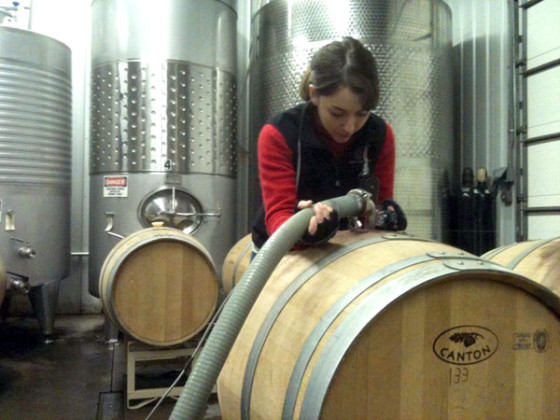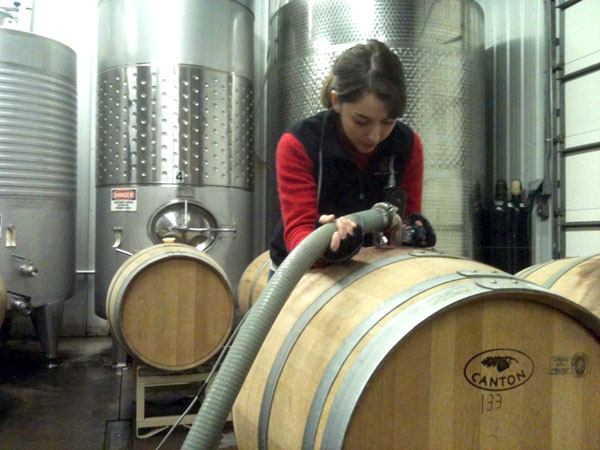
It was inevitable that women would conquer wine, and winemaking, as a small-but-not-unrelated stop on their way to conquering the top government posts that they have long been owed, in this country and others. Men have ruled for too long, and look where that’s gotten the world: on the brink of nuclear annihilation, or financial ruin, or The Singularity, or some such embarrassing way to ruin this improbable oasis in a heretofore barren universe. From the Russian satellites to Syria to the job markets to the pathetic level of political discourse, blame the men. We’ve proven ourselves incapable stewards. Anyway, any man who has witnessed childbirth understands that we are an inferior species.
So for now, winemaking it is.
And there is something tiresome about another story about women doing something — as if the very fact that something achieved by a woman is news. “Winemaking! Isn’t that special!” Here’s hoping that this is the last such headline, and we can retire the theme of how interesting it is to see so many women in wine, or whatever damn field they please.
But two conversations last week moved me to consider this, despite my instincts. The first was with Ruth Scott, the first black president of Rochester’s City Council, and very nearly its first black mayor. In the 1950s, Ruth attended Albion College in Michigan. She was told by the dean that if women wanted jobs, they had to go into education. All other industries were closed. Teaching was the closest thing to a sure thing. Of course, Ruth being black, the dean also warned her: white parents will not be comfortable with a black woman teaching their children. So yes, education, but stick to being a librarian.
Ruth told me that most women adhered to those rules, but she wasn’t much interested in being a librarian or a homemaker or even an elementary school teacher. She chose a different path. 58 years later, her path is now closer to the norm.
The temptation is to exhale that we’ve come so far. And we have. But let’s not pretend that we’ve achieved true equality. No, the pay gap isn’t precisely what we’ve been hearing lately; women earn more than 77 cents on the dollar compared to men, but nowhere near 100 cents on the dollar. Women routinely make employment choices based on life balance, while men routinely fight for every last penny. We might never see 100 cents on the dollar, and maybe that’s understandable, given the wisdom women show, and the wisdom men don’t. But we can do better, and we can stop penalizing women simply because someday they might bare children, and we can ask ourselves what the world would look like if every CEO and government leader were female.
At the very least, there would be far fewer bullshit neighborhood fights (I’m looking at you, Vlad), far less name-calling, far less war over whether you go to the same church or mosque or temple as I do.
So back to wine. Yes, there’s a story here, and I hope it’s the last such story, but to me anyway, it’s interesting. It’s about the second conversation I had last week.
The rise of the next-generation winemakers
Peter Bell, winemaker at Fox Run Vineyards for two decades, sees a remarkable evolution.
“We are seeing a lot more women, and I think it’s industry-wide,” Bell said. “But the ration of individuals coming to me with interest or for work is five-to-one, women to men. Pick a typical individual in their mid-20s who’s on fire with wine, and it’s a female.”
Bell thinks this portends healthy things for the industry. “Absolutely it does,” he said. “When I was getting my training, there were women in the wine business, but they were often shoved to the side. It was assumed that they didn’t want to do the physical tasks. They were given lab work, etc. That’s long gone now. I have women working for me who are a whole lot stronger than I am.”
Does Bell see strengths in women that he doesn’t find in men? “It’s an over-simplification to say that women make better tasters, but it’s an interesting conversation to have. You would never dream of saying they aren’t at the very least equal to the task, if not more so.”
Bell’s experience does not translate perfectly at Finger Lakes Community College, where Paul Brock teaches Viticulture and Wine Technology. Of the 58 current advisees listed in his program, 21 are women. That’s 36 percent.
But imagine if the Finger Lakes wine industry was comprised of even 36 percent female winemakers. The current total is something less than 5 percent. Nancy Irelan, Lindsay Stevens and Marti Macinski, for example, remain in a small minority.
How did things change?
26-year-old Alex Doniger made her first solo wine in 2013, a sauvignon blanc for Hector Wine Company on Seneca Lake. Doniger is the assistant winemaker to head winemaker Justin Boyette. She’s become a winemaker by doing what many women her age have done: they’ve not only shied from the physical work. They’ve demanded to take on every role the men have.
“I love the idea that it’s not always easy and that each year we have to adjust,” Doniger told me. “We have to change and learn with vintage variation. It keeps me on my toes.”
Doniger earned a degree in Literature and Writing from SUNY Potsdam, but moved quickly into wine. Perhaps she would have chosen a degree from the still-rather-new viticulture program at Finger Lakes Community College, but Doniger didn’t allow her lack of a wine degree to stop her. “I decided on apprenticeships and on-the-job training to pursue winemaking,” she said. In other words: the industry loves cheap help, and with a foot in the door, she became obsessed with proving herself.
“I went to as many classes as I could find and afford,” Alex said. Those classes were in New York City and Connecticut, and she expects to attend harvest in other regions to broaden her education. “I continue to also go to oenology conferences, seminars, and workshops throughout the year.”
Boyette and the team at Hector Wine Company have given Doniger room to experiment and learn, even if it means making mistakes. It’s all part of the process, and Doniger could end up as a head winemaker before long.
“After moving to the Finger Lakes I very quickly realized I made the right choice,” she said. “Wine represents so much. It’s the land, the place, the people.”
A balanced future
When it comes to equality, the extremes on both sides have peddled in attacking straw men. Town Hall and Fox News and its ilk would have you believe that the left wants to turn every person into an ungendered, same-sized, same ability machine. No allowing anyone to get ahead; no recognizing differences. Bill O’Reilly huffed that Shaquille O’Neal is more than seven feet tall, so of course he’ll be better at basketball: true equality is impossible!
But no one is asking for perfect equality. The left, generally speaking, wants equal opportunity. The common mistake on the left is to assume that everyone on the right wants to hold women down, keep them in the kitchen, cranking out babies. That’s also largely a straw man: conservatives rightly point out that while women earn less than men, they make better choices for family and balance. You can’t engineer that aspect out of women, they say, and if men want to bloody themselves in every work negotiation, they have to live with the consequences. Are a few extra pennies on the dollar worth that?
If I sound like a have-it-both-ways weakling, I assure you I’m not. The left is more correct on this one. We should be embarrassed that women earn far less than men for the same work. And yes, John Stossel, it is indeed unfair to women that bosses suspiciously view young women as potential future mothers. Denying women promotions on those grounds is nauseating.
In wine, it’s about merit, and it’s about creating complex, balanced wines. It should be no surprise that women are so adept at this; they create more balanced lives, on average, than men. Robert Parker likes sledgehammer wines, but as they say in Portlandia, that’s so over. The sledgehammer is created to take things apart, not to put things together. In wine, and in work negotiations, that’s something to remember.
“Women have been making wine for such a long time, and I think it’s just that there’s been a surge here in the Finger Lakes making everyone take notice,” Doniger said. “I think a good winemaker is a good winemaker, regardless of sex. A woman might pick up on a taste or smell that a man missed, and vice versa, so it really boils down to the good differences between us.”

